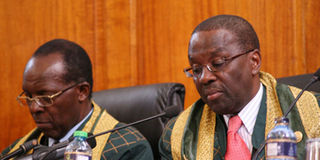Gender rule to take effect in 2015

PHOTO | PHOEBE OKALL Supreme Court president Willy Mutunga (right) and Justice Jacktone Ojwang’ deliver an advisory opinion on the gender equity rule at the court in Nairobi on December 11, 2012.
What you need to know:
- Only Chief Justice and president of the Supreme Court Willy Mutunga had a dissenting opinion, ruling that there is still time for Parliament to enact appropriate legislation to ensure Kenyan women get the one-third gender representation in Parliament and Senate
- Education Minister Mutula Kilonzo, who initiated the Bill to implement the two-thirds gender rule, criticised the Supreme Court ruling
The Supreme Court on Tuesday ruled that the two-thirds gender rule cannot be achieved in the next elections.
A majority of the five-judge bench was of the opinion that the constitutional requirement that not more than two-thirds of the same gender should occupy elective posts is progressive and can only be achieved by August 27, 2015.
Only Chief Justice and president of the Supreme Court Willy Mutunga had a dissenting opinion, ruling that there is still time for Parliament to enact appropriate legislation to ensure Kenyan women get the one-third gender representation in Parliament and Senate. (Read: AG, groups fight over gender case)
But justices Jacktone Ojwang’, Philip Tunoi, Dr Smokin Wanjala and Njoki Ndung’u said if appropriate legislation are not in place by March 4 2013, it would not apply to the next elections, but could only apply to County Assemblies.
“Bearing in mind the terms of Article 100 on promotion of marginalised groups and the Fifth Schedule providing time frames for enacting required legislation, we are of the opinion that legislative measures to give effect to the two-thirds gender principle in relation to National Assembly and Senate should be taken by August 27 2015,” ruled the judges.
They said that although they were aware Article 27 leaves no doubt that the state shall ensure no one gender is more than two-thirds, there were several things which still had to be done.
They added that progressive realisation of the affirmative action is not unconstitutional since the gender quota will eventually be achieved in bits through appropriate legislation.
But Education Minister Mutula Kilonzo, who initiated the Bill to implement the two-thirds gender rule, criticised the Supreme Court ruling.
“I do not agree with the ruling. I find it very strange indeed,” the former Justice minister said.
He told the Nation on Tuesday that he had hoped the court would rule in favour of women’s political empowerment.




